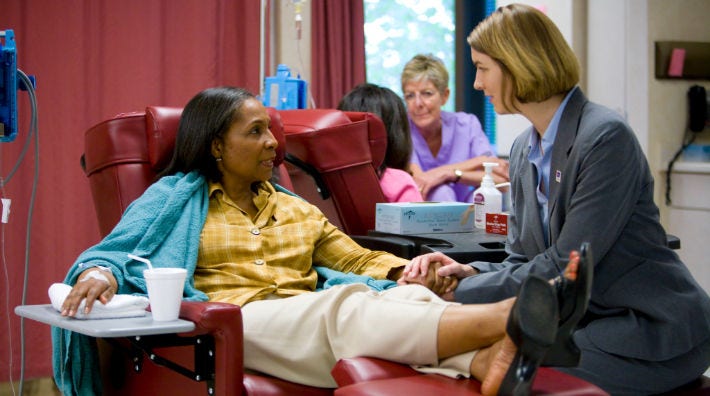What to Expect on Your First Day of Chemo

If your first day of chemo is coming up, you can prepare in some practical ways. You might be wondering what to bring along, how the treatment will feel, how long it will take, or if you’ll need a ride to and from the infusion clinic.
Knowing what to expect before the appointment for your first infusion can help ease anxiety. Your care team should give you a rundown of the details ahead of time, but if anything seems unclear, you can ask them to help you understand.
“This is something that your health care team does all the time, but it’s new to you. There’s no harm in asking questions if you’re not sure what to expect,” said Norah Lynn Henry, MD, PhD, an American Society of Clinical Oncology (ASCO) expert and medical oncologist at the University of Michigan Rogel Cancer Center.
What types of cancer treatment are given as infusions?
People usually think of chemotherapy as an infusion treatment. It’s true that chemo is most often given as an infusion into a vein through an intravenous line (IV) or implanted port. Depending on the chemo type and regimen, though, it can be given in other ways as well. It may be given as an injection, in a pill or capsule, or through a pump.
Other types of cancer treatment can also be given by infusion, including targeted therapy and immunotherapy. While these treatments are often referred to as “chemo,” they actually work differently than chemo does.
- Chemo uses strong medicines to destroy cancer cells.
- Targeted therapy uses medicines that target certain mutations or features that make a cancer grow.
- Immunotherapy uses the body’s own immune system to destroy cancer cells.
In some cases, multiple types of treatment might be part of a cancer treatment plan or regimen. Sometimes, different types are given during the same infusion session. A treatment might also include additional medicines to help manage side effects, such as nausea or vomiting. Other medicines may be given to help prevent an infusion reaction. You may hear your infusion nurses calling these pre-medications or “pre-meds.”
The night before treatment
Before your infusion, find out if you need to make changes to your diet or activity based on the specific type of treatment you will be getting. Ask your health care team about any other restrictions or limitations. Typically, you can eat normally and take your usual medications the night before treatment. But if you’re not sure, ask your doctor.
The night before, pack a bag of things you might need. These include:
- A book or tablet to help pass the time
- Earphones or earbuds if you plan to watch a movie or listen to music
- Snacks and water
- Lip balm and hard candy in case your mouth gets dry
- A notebook for writing down questions
- A jacket or blanket in case you get cold
- A handheld fan in case you get hot
- A cold cap to help prevent hair loss, if using one has been recommended
- Cooling gloves or booties to help prevent numbness and tingling in your hands and feet, if these items have been recommended for you
Make sure you have a ride to and from the appointment, especially for your first treatment. “We often don’t know until the day of treatment if we’re going to have to give you a medication that might make you sleepy,” said Dr. Henry.
Finally, try to get a good night’s rest. Infusion days can be long, in some cases lasting up to 8 to 10 hours.
The day of treatment
Start your day with a light meal, unless your doctor has said otherwise.
Be sure to dress comfortably and wear something that allows easy access to your arm or chest, if you have a port or IV catheter. For example, you can wear a short-sleeved shirt or a button-up.
You should also plan to arrive at your appointment about 15 minutes early to allow time for any labs to be drawn or unexpected delays.
Continue following any pre-treatment instructions from your doctor.
Getting ready for the infusion
Once you arrive, the care team will go through their usual routine. This could include getting your current weight and checking your vital signs. Sometimes, blood work might be needed on the day of treatment. You may also need to sign a consent form before the infusion is started. To be sure you understand what to expect, use this time before your infusion to ask your infusion nurse any remaining questions, such as:
- What side effects might I experience during the infusion?
- What are the potential side effects after treatment?
- How long can I expect the side effects to last?
During treatment
Most cancer treatment centers and clinics have an infusion room. Some clinics have separate cubicles or rooms with chairs and beds for people getting treatment. But more likely, you can expect to be in a large room with comfortable chairs and other people receiving treatment. Curtains or room dividers may separate the chairs.
Before your treatment, the nurse will start an IV in your hand or arm or access your port or IV line (catheter). You might receive fluids, anti-nausea medications, or anti-anxiety medications before the cancer treatment starts. Remember to tell the nurse if you’ve taken any other medications that day to be sure they won’t interact with treatment or pre-meds.
The nurse will tell you when they start the cancer treatment itself. Then they’ll watch for any reactions. They may take your vital signs regularly. Typically, you shouldn’t feel anything during the treatment itself, aside from possible sleepiness from the pre-meds.
“Anytime you’re in the infusion room, if you feel weird or something just doesn’t seem right, always tell the nurse,” said Dr. Henry. “You don’t want to assume that it’s normal.”
If you have a reaction, the care team will follow a set of protocols to stop it. Often, you can still continue treatment even if you’ve had a reaction.
When you’re getting a chemo infusion, it’s usually fine to do anything quiet that helps you pass the time. Many centers also allow you to bring a support person during treatment.
After the infusion
You might feel sleepy after the infusion. But most people don’t feel other side effects until later on. “People often assume that they’re going to feel unwell immediately, and most of the time, that isn’t the case,” said Dr. Henry. “People may actually feel pretty good, depending on what treatment they received.”
Before you leave, be sure to ask any questions that come to mind. Your care team will give you a set of instructions to follow, including:
- Any medications you should take or any you should avoid
- Side effects to watch for and how to track them
- Any lab work or other tests that may be needed before your next appointment
- The date and time of your next appointment and/or treatment
- Who to contact in case of any urgent and non-urgent problems
Dr. Henry suggests putting that contact number in your phone before you leave the treatment facility.
Learn more about cancer treatment and helpful resources from the American Cancer Society:
- Cancer Care Toolkit
- ACS CARES App
- Lodging During Treatment
- Rides To Treatment
- Preparing For Treatment
- Making Treatment Decisions
Dr. Henry is a member of ASCO’s Patient Information Advisory Committee.
- Written by

Written by the American Society of Clinical Oncology (ASCO) with medical and editorial review by the American Cancer Society content team.



